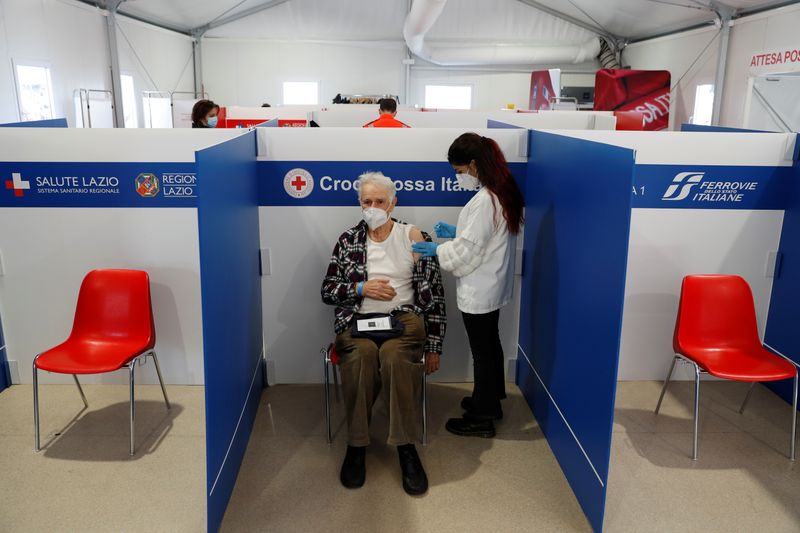By Nancy Lapid
(Reuters) - The following is a summary of some recent studies on COVID-19. They include research that warrants further study to corroborate the findings and that has yet to be certified by peer review.
Long COVID risk not lower after breakthrough infection
COVID-19 vaccines are highly effective in protecting against serious illness, but they do not protect against "long COVID" in people who become infected despite vaccination, new data show. For six months, researchers tracked 9,479 vaccinated individuals diagnosed with COVID-19 and about the same number of infected patients who had not been vaccinated. Compared to the unvaccinated patients, people with so-called breakthrough infections were "at a much lower risk of severe complications of COVID-19" such as the need to be admitted to an intensive care unit, requiring breathing assistance, or developing a blood clot in their legs or lungs, said Maxime Taquet of the University of Oxford. But other complications of the virus, including the syndrome of lingering symptoms known as long COVID, occurred at similar rates regardless of vaccination status, his team said in a paper posted on medRxiv ahead of peer review. In people over age 60 with breakthrough infections, vaccines protected against COVID-19 complications only weakly or not at all, Taquet noted. "Vaccines are still an excellent way to prevent any complication of COVID-19 (including long COVID) since they prevent infection in the first place," Taquet said. "However, these findings show that those who get infected despite being vaccinated should remain vigilant about potential complications of their illness."
COVID-19 survival has improved for European cancer patients
European cancer patients who get sick with COVID-19 are much more likely to survive now than they were earlier in the pandemic, researchers found. They reviewed the outcomes of more than 2,600 cancer patients with coronavirus infections treated in six countries between February 2020 and February 2021 to calculate death rates within the first two weeks after diagnosis. "The initial studies on the topic documented a mortality rate ranging from 30% to 40%... in patients with cancer," said Dr. David James Pinato of Imperial College London. "Our study suggests that over the course of the pandemic the mortality has gradually reduced, even before vaccines were implemented, reducing to a figure that was as low as 12.5% during the so called 'second wave' in Europe." Cancer patients diagnosed earlier in the pandemic also had more COVID-19 complications, his team reported on Wednesday in JAMA Oncology. The researchers believe the improved survival is related not only to better treatments but also to better availability of COVID-19 tests that allow for earlier diagnosis. These factors "have been key in improving overall outcome," Pinato said.
'Glimpse of hope' when drugs limit vaccine antibodies

People taking a class of drugs known to limit the antibody response of the mRNA COVID-19 vaccines from Pfizer/BioNTech or Moderna (NASDAQ:MRNA) may get some protection from another part of the immune system, according to a small study published in Clinical Infectious Diseases. The class of anti-CD20 drugs used to treat rheumatoid arthritis, some cancers and other conditions, such as Roche's Rituxan (rituximab), suppress the immune system. But the new findings offer "a glimpse of hope" that these patients may get some protection from the mRNA vaccines after all, the study's leader said. The researchers studied mRNA vaccine responses in 37 patients taking these drugs for rheumatic diseases or multiple sclerosis, comparing them to 22 individuals with healthy immune systems. Only about 70% of the patients developed antibodies in response to the mRNA vaccines, and their levels were significantly lower than levels in the healthy volunteers. However, both groups had equal levels of immune cells called T cells that could recognize and attack the coronavirus. "Our study suggests that patients on anti-CD20 treatment are able to mount potent T-cell responses to mRNA COVID-19 vaccines," despite impaired antibody responses, the researchers wrote. The size of the study "does not allow us to draw firm conclusions about protection from severe COVID-19 in these patients," said Dr. Christiane Eberhardt of the University of Geneva in Switzerland. They "should still be vigilant and protect themselves from getting infected."
Graphic: Vaccines in development: https://graphics.reuters.com/HEALTH-CORONAVIRUS/VACCINE-TRACKER/xegpbqnlovq/